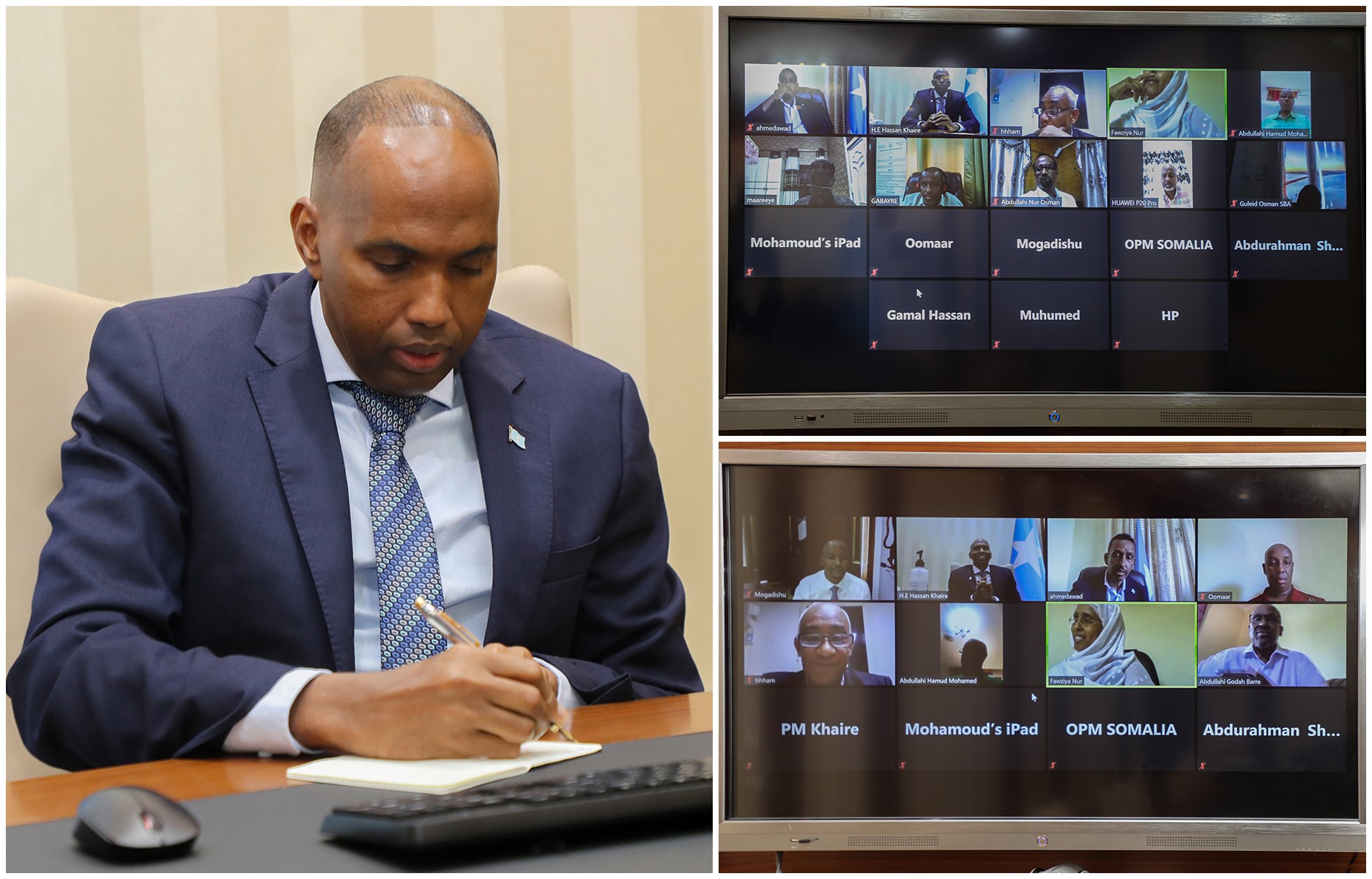
Despite calamity, Somalia plans to hold its first national elections for first time in decades
|
24 May 2020 12:08

MOGADISHU (HORN OBSERVER) Somali government is looking ahead to its first direct elections in a half-century, the top UN official in the country told UN Security council on Thursday, in a time of dramatic crisis as a result COVID-19 and floods that wreak havoc in parts of the country.
There are set of tasks which the government, under the leadership of Prime Minister, Hassan Ali Khaire, had to complete in the coming weeks including the adoption of core amendments to the Political Parties Law, designating constituencies, allocating Upper House seats, and guaranteeing thirty percent of the parliamentary seats for women.
National elections
The cabinet of the ministers, in a meeting in May 2 last year, adopted the national electoral legislation prepared by the Ministry of Interior, Federalism and Reconciliation. According to a statement from PM Khaire’s office, the purpose of the national electoral law, which was endorsed by the Federal Parliament in December 2019, was to conduct free and fair elections, to identify the powers and responsibilities of the National Independent Electoral Commission (NIEC) and to define and describe the country's electoral system.
"In the light of the constitutional review process, the Federal government and federal member states have reached a political agreement on the model of elections in the country and sharing natural resources,” Prime Minister Hassan Ali Khaire told the opening of the fifth session of Upper House of the Federal parliament of Somalia on April 1, 2019.
On May 27, the Chairperson of NIEC, Halima Ismail Ibrahim is expected to report to a joint session of the Houses of the Parliament on plans for conducting elections within the constitutional timeframe.
Ensuring the secure poll in the horn of African country, the Somali PM directed the establishment of the National Electoral Security Task Force, which as the PM himself reiterated, will be a significant part of the efforts to guarantee the necessary security arrangements made ready for the country’s voting to take place. This also includes consensus building among political leaders, the civil society so that the elections enjoy broad support and acceptance.
Setting national priorities
Prior to Covid-19 pandemic which Somalia confirmed the first case on March 16, the country had set ambitious national priorities for this year. These include the holding of the first direct elections in Somalia since 1969.
The United Nations Secretary General’s Special representative for Somalia, James Swan has emphasized holding of peaceful, inclusive, credible and transparent one-person-one-vote elections would be a historic step in rebuilding Somalia and would assist with the country’s continued democratic development.
"In addition to the focus on elections, we also note the importance of Somalia making progress on other critical state-building priorities. These include formation of the Constitutional Court, the Judicial Services Commission, and an independent Human Rights Commission, as well as completing the review of the Federal Constitution,” Mr Swan said during a briefing to the UN Security Council on Thursday May 21.
Somali government is boosting its credibility in improving the country’s public financial management, received debt relief under the Enhanced HIPC Initiative enabling the country to become eligible for budget support and grant financing and gave a priority to hold historic elections since 1969.
Disaster Response and Covid-19
Before the Coronavirus outbreak, Somalia faced severe humanitarian challenges. More than 5 million Somalis required humanitarian assistance and 2.6 million internally displaced persons are particularly at risk. As floods hit towns and villages in the southern and northeastern parts of the country, it is estimated that nearly one million people are now affected by the flooding. The country also faces its worst desert locust infestation in more than two decades.
The Office of the Somali PM took the leadership to effectively respond to the floods-hit places such as Qardho of Puntland, Beletweyn of Hirshabelle, Bardhere of Jubaland and Bardale in South West which Prime Minister Khaire’s government did all it could to contain the situation by dispatching humanitarian aid with the support of the UN agencies in the country and other International aid organizations.
In addition to the humanitarian and medical impacts, Covid-19 is also having a severely negative economic impact on the country including having negatively impacted the remittances from the diaspora that are the lifeline of the Somali people. There are more than 1,500 recorded cases of Covid-19 although the actual figures are almost certainly much higher. 61 others have been confirmed dead due to the virus in about four months’ period so far, showing the government’s commitment in controlling the disease. Federal Government and Federal Member States have responded quickly to the crisis within their means. This follows the establishment of the National COVID Task Force in early March, under the chairmanship of Prime Minister Hassan Khaire.
The government established isolation centres and brought testing laboratories by expanding hospital capacities with the help of the United Nations enabling them to encompass the situation controllable.
Payment Systems
The government has made strides in major institutional reforms in the security forces, including improvements to management and personnel systems. The Somali government for the first time implemented a new system to pay its army, ensuring the money reaches to the soldiers in the payroll directly. Proper payment system was put in place after having stored soldiers' fingerprints, personal details and bank accounts into biometric database.
There are set of tasks which the government, under the leadership of Prime Minister, Hassan Ali Khaire, had to complete in the coming weeks including the adoption of core amendments to the Political Parties Law, designating constituencies, allocating Upper House seats, and guaranteeing thirty percent of the parliamentary seats for women.
National elections
The cabinet of the ministers, in a meeting in May 2 last year, adopted the national electoral legislation prepared by the Ministry of Interior, Federalism and Reconciliation. According to a statement from PM Khaire’s office, the purpose of the national electoral law, which was endorsed by the Federal Parliament in December 2019, was to conduct free and fair elections, to identify the powers and responsibilities of the National Independent Electoral Commission (NIEC) and to define and describe the country's electoral system.
"In the light of the constitutional review process, the Federal government and federal member states have reached a political agreement on the model of elections in the country and sharing natural resources,” Prime Minister Hassan Ali Khaire told the opening of the fifth session of Upper House of the Federal parliament of Somalia on April 1, 2019.
On May 27, the Chairperson of NIEC, Halima Ismail Ibrahim is expected to report to a joint session of the Houses of the Parliament on plans for conducting elections within the constitutional timeframe.
Ensuring the secure poll in the horn of African country, the Somali PM directed the establishment of the National Electoral Security Task Force, which as the PM himself reiterated, will be a significant part of the efforts to guarantee the necessary security arrangements made ready for the country’s voting to take place. This also includes consensus building among political leaders, the civil society so that the elections enjoy broad support and acceptance.
Setting national priorities
Prior to Covid-19 pandemic which Somalia confirmed the first case on March 16, the country had set ambitious national priorities for this year. These include the holding of the first direct elections in Somalia since 1969.
The United Nations Secretary General’s Special representative for Somalia, James Swan has emphasized holding of peaceful, inclusive, credible and transparent one-person-one-vote elections would be a historic step in rebuilding Somalia and would assist with the country’s continued democratic development.
"In addition to the focus on elections, we also note the importance of Somalia making progress on other critical state-building priorities. These include formation of the Constitutional Court, the Judicial Services Commission, and an independent Human Rights Commission, as well as completing the review of the Federal Constitution,” Mr Swan said during a briefing to the UN Security Council on Thursday May 21.
Somali government is boosting its credibility in improving the country’s public financial management, received debt relief under the Enhanced HIPC Initiative enabling the country to become eligible for budget support and grant financing and gave a priority to hold historic elections since 1969.
Disaster Response and Covid-19
Before the Coronavirus outbreak, Somalia faced severe humanitarian challenges. More than 5 million Somalis required humanitarian assistance and 2.6 million internally displaced persons are particularly at risk. As floods hit towns and villages in the southern and northeastern parts of the country, it is estimated that nearly one million people are now affected by the flooding. The country also faces its worst desert locust infestation in more than two decades.
The Office of the Somali PM took the leadership to effectively respond to the floods-hit places such as Qardho of Puntland, Beletweyn of Hirshabelle, Bardhere of Jubaland and Bardale in South West which Prime Minister Khaire’s government did all it could to contain the situation by dispatching humanitarian aid with the support of the UN agencies in the country and other International aid organizations.
In addition to the humanitarian and medical impacts, Covid-19 is also having a severely negative economic impact on the country including having negatively impacted the remittances from the diaspora that are the lifeline of the Somali people. There are more than 1,500 recorded cases of Covid-19 although the actual figures are almost certainly much higher. 61 others have been confirmed dead due to the virus in about four months’ period so far, showing the government’s commitment in controlling the disease. Federal Government and Federal Member States have responded quickly to the crisis within their means. This follows the establishment of the National COVID Task Force in early March, under the chairmanship of Prime Minister Hassan Khaire.
The government established isolation centres and brought testing laboratories by expanding hospital capacities with the help of the United Nations enabling them to encompass the situation controllable.
Payment Systems
The government has made strides in major institutional reforms in the security forces, including improvements to management and personnel systems. The Somali government for the first time implemented a new system to pay its army, ensuring the money reaches to the soldiers in the payroll directly. Proper payment system was put in place after having stored soldiers' fingerprints, personal details and bank accounts into biometric database.
Before the new system of payments were put in place, the salaries, intended for the national army fighting against the Shabab, have been diverted resulting some of the members of the Somali army on the frontline to quit the duty over unpaid dues.
- Horn Observer -
Leave a comment
- Popular
- Rated
- Commented
04/11/2021 - 11:05:02
28/05/2024 - 15:44:10
01/03/2021 - 09:00:37
Opinions
15/06/2025 - 11:53:55
14/06/2025 - 22:05:59
12/06/2025 - 22:33:40
Politics
05/06/2025 - 13:42:50
Terror Watch
16/06/2025 - 00:13:38
14/06/2025 - 22:05:59
07/06/2025 - 21:36:45
Press Releases
14/06/2025 - 11:35:22
12/06/2025 - 22:36:39
 0
0 



































Despite calamity, Somalia plans to hold its first national elections for first time in decades
MOGADISHU (HORN OBSERVER) Somali government is looking ahead to its first direct elections in a half-century, the top UN official in the country told UN Security council on Thursday, in a time of dramatic crisis as a result COVID-19 and floods that w